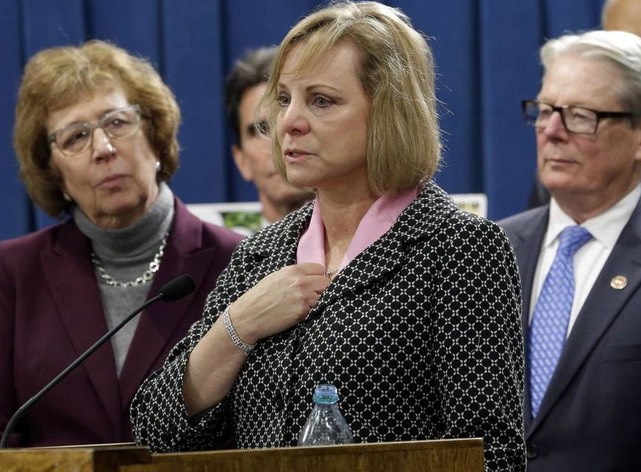Senate Bill 128 sent to Assembly on 23-14 vote
Allows doctors to provide lethal drugs to patients with less than six months to live
Chances improved after California Medical Association dropped opposition
BY ALEXEI KOSEFF
In an emotional vote on Thursday, the California Senate advanced a controversial proposal allowing terminally ill people to seek life-ending medication.
Modeled on a law first enacted in Oregon in 1997, Senate Bill 128 would permit doctors to provide lethal drugs to patients with less than six months to live. The measure passed 23-14, over passionate objections from Republicans who argued it devalues life.
The deeply personal debate lasted for more than an hour-and-a-half, as senators shared stories of lost loved ones and their own struggles with suicidal thoughts. Democrats urged their colleagues to support a “compassionate” end-of-life option that lets people die in peace.
“I was 17 when my vibrant young mother ended a three-year struggle with metastatic cancer, and it was frankly brutal,” said Sen. Lois Wolk, D-Davis, who authored the measure.
“Her suffering was prolonged and unbearable – for her, certainly, and also for her family,” she said. “It does not have to be this way.”
While Washington and Vermont have since followed Oregon in legalizing assisted death, numerous proposals from California lawmakers have fallen short over the years in the face of vocal concerns from doctors, the Catholic Church and disability rights groups. The last major effort, by then-Assembly members Patti Berg, Lloyd Levine and Fabian Núñez in 2007, was never brought to the floor for a vote.
Proponents were buoyed this time, however, by the story of Brittany Maynard, a Bay Area woman with brain cancer who gained national attention last fall when she moved to Portland to take advantage of Oregon’s law. Her widowed husband, Dan Diaz, and mother, Deborah Ziegler, sat in the back of the Senate chamber on Thursday with a portrait of Maynard.
“The Senate vote, I feel, is an affirmation of what Brittany started,” Diaz said at a news conference following the vote. SB 128 “will not lead to more people dying. It will lead to fewer people suffering.”
Choking back tears, Ziegler said she felt Maynard’s “presence swirling around, her energy, her love.”
“I am so proud of her, and I am so proud of California senators today,” Ziegler added.
Sen. Cathleen Galgiani, D-Stockton, framed the vote as an ethical responsibility for the Senate. As medical science allows doctors to prolong life, she said, patients and their families are faced with more difficult choices.
“This bill gives guidance to someone who’s dying … about whether everything has been considered,” she said. “It will give loved ones the ability to move to their next life without guilt, without shame, and it will give loved ones the chance to say goodbye.”
Nine Republican lawmakers rose to speak against the bill. Some opposed it on religious grounds, saying the state should not make life or death decisions. Sen. Ted Gaines, R-Roseville, suggested it violates the Declaration of Independence.
“It is a total inversion of (the government’s) purpose, to transform it into an instrument of death,” he said.
Sens. Sharon Runner, R-Lancaster, and Joel Anderson, R-Alpine, confessed to grappling with a desire to die during medical crises, and asked their colleagues not to give sick people a reason to give up.
“You bet I thought about suicide. You bet I did,” Anderson said, his voice wavering. “I don’t want to do anything that the state sponsors to strip hope and add guilt to our citizens.”

Urging his colleagues not to “sanitize” the discussion, Sen. Bob Huff, R-Diamond Bar, reminded them that many doctors believe assisting in a patient’s intentional death violates their role as healers. “Reality is this is aid in killing,” he said.
A major obstacle was cleared last month when the California Medical Association dropped its long-standing opposition because of provisions that would allow physicians with moral objections to opt out of the law.
Wolk thanked the CMA for providing guidance on bill language and pointed to numerous safeguards for patients, who must be assessed by two independent physicians, provide two written and one verbal request for the lethal drugs, and wait 15 days before a doctor writes a prescription.
“It must be an affirmative, conscious act,” Wolk said.
Disability rights advocates have led the campaign against SB 128, arguing that legalizing assisted suicide would put the elderly and other vulnerable Californians in harm’s way.
“This bill … tells people with disabilities who face a terminal diagnosis, that may well prove inaccurate, that there is no dignity in our lives,” Marilyn Golden of the Disability Rights Education & Defense Fund said in a statement. “Assisted suicide is dangerous, and we are going to bring that message loud and clear to every member of the state Assembly and the governor.”
SB 128 heads next to the Assembly, where supporters are hopeful that CMA’s neutrality will ease passage. Gov. Jerry Brown, who once trained to be a Jesuit priest, has yet to weigh in publicly on the proposal, but his office confirmed on Thursday that he spoke with Maynard by phone before she died.
Complete Article HERE!

